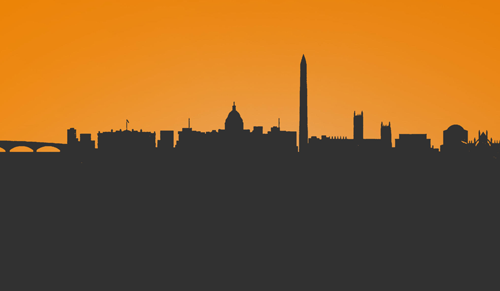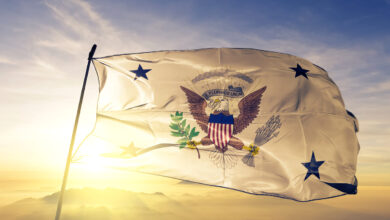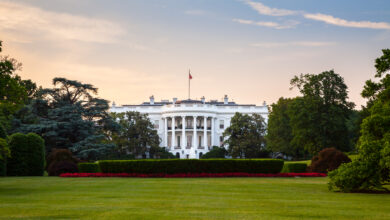
The Quick Take
A quick look at the headlines this week 👀🏃🏻♀️
- Escalating tensions: Last week, two commercial tankers were attacked in the Gulf (one was Japanese, the other Norwegian). Fingers pointed to Iran. Washington announced plans send about 1,000 more troops to the Middle East. On Thursday, Iran shot down a US surveillance drone. Gulp.
- Hong Kong: Those protests against the proposed bill that would allow extradite suspects to mainland China managed to put a vote on hold. Hong Kong’s chief executive apologized for her handling of it, but didn’t say she’d scrap it. This is definitely not over. (And we loved The Economist headline on this Carrie On….)
- Saudi Arabia: Following an investigation, a new UN report says that Saudi Arabia is responsible for the murder of Jamal Khashoggi in its Istanbul consulate last year, and there is credible evidence justifying an investigation into the role of the Saudi crown prince, Mohammed bin Salman.
- US Defense Secretary: Patrick Shanahan, who had been serving as the Acting Defense Secretary, withdrew his nomination as Defense Secretary. That revolving door of appointees is spinning!
- Morsi dies in Egypt: Egypt’s first democratically elected president, Mohamed Morsi, died on Monday, in court. He had been held in solitary confinement for six years, since he was deposed by the current government led by Abdel Fattah el-Sisi.
- Istanbul mayor election rerun: Though he won on March 31, Istanbul mayoral candidate Ekrem İmamoğlu faces a rematch with Binali Yıldırım this Sunday. Yıldırım represents Erdoğan’s party, the AKP. Yeah, Erdoğan didn’t like that his guy lost. Do over democracy.
- Slovakia: Zuzana Čaputová was sworn in as the first female president of Slovakia on Saturday.
- Guatemala: Former Guatemalan first lady, Sandra Torres, is the front-runner following Sunday’s presidential election. She’ll head into a runoff on August 11. One person to note: Thelma Cabrera Pérez, an indigenous campesino woman, rose in the polls.
- Moldova: Maia Sandu became prime minister of Moldova after months of political deadlock following elections in February. And here’s something: She’s not the first woman to hold the top spot.
- ASEAN meeting: The annual ASEAN summit takes place on June 23. More on this below.
- G-20: The 20 strongest economies meet next week in Japan. How will Xi and Trump engage? #Awkward
- Ottawa grows! Ottawa hit one million in population on Friday.
Bombs Away!
Will there be war with Iran? That’s definitely the topic du jour, especially after a week of tanker attacks and drone downings, which makes a confrontation all the more likely. Yet, even before these two incidents, speculation about a US-Iran confrontation had gained traction over the past year. Let’s hope there is also some thought about what happens if that confrontation does happen. How does it end?
Trump’s opposition to the Iran Nuclear Deal (Joint Comprehensive Plan of Action, JCPOA) was well known. “It’s the worst deal ever.” Still, he kept it in place for a year, when steady and experienced military hands steered the Defense Department (Jim Mattis), the National Security Council (H.R. McMaster), and the White House (Chief of Staff John Kelly). Indeed, all three understood, first hand, the challenges and tragedy of war. They also saw the tremendous instability that came after the 2003 Iraq invasion. The Middle East: the forever bête noire.
Today, hawks surround Trump. NSC Advisor John Bolton is a well known hardliner, with a special gripe with Iran. Secretary of State Mike Pompeo was a vocal advocate of scrapping the JCPOA, in favor of sanctions. Their endgame seems to be regime change from within; hoping that economic pressure will result in a grassroots revolution to topple Tehran’s mullahs. Squeeze-it democracy!
Iran’s supreme leader, Ali Khamenei, said this past week that Iran does not want war with the US. But Saudi Arabia, who has been locked in a proxy war with Iran in Yemen, does, especially as Saudi prince, Mohammad bin Salman, feels global heat following a UN report out this week that points fingers at him for calling for Jamal Khashoggi’s murder. Divert, divert, divert.
A US-Iran confrontation might also benefit Turkey. The country has not had a good relationship with the US for sometime. Things got worse last summer when Trump clashed with Erdoğan over an American pastor being held in Turkey. Things have worsened as Turkey signed a deal with Russia for S-400 missile defense system. It now faces possible sanctions from the US. Erdoğan meets with Trump next week on the margins of the G-20. I’d be surprised if the Turkish president didn’t remind Trump about a key base in Turkey, Incirlik, that would come in handy if there were war with Iran.
There is also the possibility that cooler heads prevail and everyone stands down. That would certainly be the best outcome. It still wouldn’t solve the other problems facing the US and the world — trade wars, climate change, cybersecurity, global pandemics. And those are just the few that come to mind immediately. Thinking about those make a march to war even more irrational. But rational is not this White House.
More on US-Iran:
- Claire Parker breaks down Iran’s relationships with allies and proxies across the Middle East. (Washington Post)
- As tensions between the US and Iran heat up, Tehran has decided its best defense is bravado, says Reva Goujon. (Stratfor)
- Tensions are rising in the Persian Gulf following recent attacks on tankers, but oil markets are reacting “with a shrug and a yawn.” Samantha Gross explains why. (Brookings)
- War with Iran is probably less likely than you think, say Elizabeth Saunders and Michael Horowitz. (Monkey Cage)
- She promised a consultative style of government. But Hong Kong’s chief executive, Carrie Lam, has failed to grant citizens anything resembling that. That’s due to her arrogance, says Alice Wu. (South China Morning News)
- Taiwan stiffens resistance to China after Hong Kong crackdown, writes Kathrin Hille. (FT)
- The people of Hong Kong have secured a remarkable victory, but they have far more cause to worry than to celebrate, writes Frida Ghitis. (CNN)
- For now and for the past 20 years, Hong Kong has been fighting with grace, and its people need all the encouragement and global support they can get, Melissa Chan argues. (Washington Post)
- Why do the Hong Kong activists matter to us? Because their cause is universal, Natalie Nougayrède argues. (Guardian)
- At home and abroad, the CCP is fighting a defensive ideological battle against liberal norms of democracy and human rights, but so far at least, it is not engaged in a determined effort to spread autocracy, Jessica Chen Weiss writes. (Foreign Affairs)
To read the entire edition of FP Interrupted, click here. To subscribe to FP Interrupted, click here.




